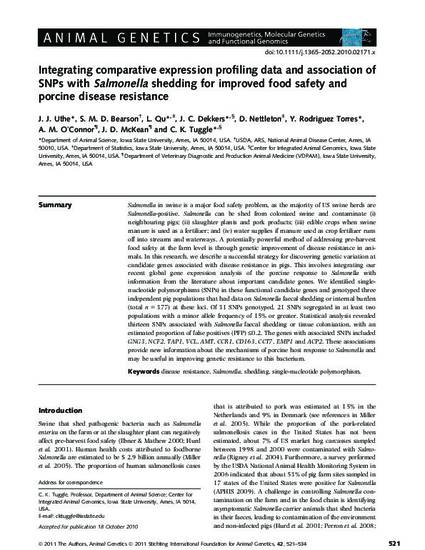
Salmonella in swine is a major food safety problem, as the majority of US swine herds are Salmonella-positive. Salmonella can be shed from colonized swine and contaminate (i) neighbouring pigs; (ii) slaughter plants and pork products; (iii) edible crops when swine manure is used as a fertilizer; and (iv) water supplies if manure used as crop fertilizer runs off into streams and waterways. A potentially powerful method of addressing pre-harvest food safety at the farm level is through genetic improvement of disease resistance in animals. In this research, we describe a successful strategy for discovering genetic variation at candidate genes associated with disease resistance in pigs. This involves integrating our recent global gene expression analysis of the porcine response to Salmonella with information from the literature about important candidate genes. We identified single-nucleotide polymorphisms (SNPs) in these functional candidate genes and genotyped three independent pig populations that had data on Salmonella faecal shedding or internal burden (total n = 377) at these loci. Of 31 SNPs genotyped, 21 SNPs segregated in at least two populations with a minor allele frequency of 15% or greater. Statistical analysis revealed thirteen SNPs associated with Salmonella faecal shedding or tissue colonization, with an estimated proportion of false positives (PFP) ≤0.2. The genes with associated SNPs included GNG3, NCF2, TAP1, VCL, AMT, CCR1, CD163, CCT7, EMP1 and ACP2. These associations provide new information about the mechanisms of porcine host response to Salmonella and may be useful in improving genetic resistance to this bacterium.
Available at: http://works.bepress.com/dan-nettleton/19/

This article is from Animal Genetics 42 (2011): 521, doi:10.1111/j.1365-2052.2010.02171.x.